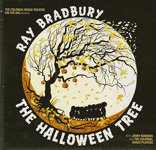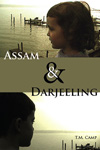
 The Halloween Tree
The Halloween Tree
By Ray Bradbury; Performed by a full cast
2 CDs – 2 hours – [AUDIO DRAMA]
Publisher: Blackstone Audio
Published: 2008
ISBN: 9781433232145
Themes: / Fantasy / Halloween / Death / Religion / Time Travel / Witchcraft / Paganism /
What is Halloween? How did it start? Where, why, what for? Witches, cats, mummy dust, haunts… it’s all there in the country from which no one returns. Would you dive into the dark ocean, boys? Would you fly in the dark sky?
This review may be a little out of season, but it was with relatively recent memories of carving jack-o’lanterns and taking my costumed children out to trick-or-treat that I listened to The Colonial Radio Players dramatized adaptation of The Halloween Tree by Ray Bradbury. This neat little tale is ostensibly for children and young adults, but it contains an illuminating look into the origins of Halloween as well as an honest exploration of our own cultural view of death, that greatest of all mysteries.
The Halloween Tree opens with eight young boys gathered together on Halloween night to go trick-or-treating. A ninth boy, Pipkin, is notably absent from the group, and when he finally emerges from his house it’s apparent something is terribly wrong: He’s pale, moving gingerly, and clutching at a lancing pain his side. But the call of Halloween is too strong and he joins his friends. Later we learn that Pipkin is suffering from an acute bout of appendicitis.
The boys decide to go trick-or-treating at a haunted house, and there they encounter the ghostly, skeletal, white-haired Mr. Moundshroud. Moundshroud takes the boys to see The Halloween Tree. En route they have to cross a deep ravine, which proves to be a metaphor for the Valley of Death, and Pipkin fails to reach the other side. When the boys call to him, his pumpkin light goes out and he vanishes from sight.
Moundshroud offers to take the boys on a dreamlike trip back through time in order to save Pipkin. Along the way he reveals the origins of Halloween and its association with death. The boys travel back to ancient Egypt and view that culture’s reverence of the dead, including its great pyramid-tombs, mummies, and the worship of the sun god Osiris, murdered each night by his jealous brother only to rise again the next morning. They are whisked away to pre-Christian Europe and encounter the cowled, scythe-wielding Samhain, the druidic god of death from which Halloween derives its origins.
The boys witness the extinction of the druids and their religion at the hands of the murdering Romans, whose polytheistic approach to religion is itself eradicated by the coming of Christ. “Now the Christians come and cut the Romans down—new altars, boys, new incense, new names,” Moundshroud says. Here I’ll mention that The Halloween Tree includes a subversive view of Christianity, as the boys witness the persecution of innocent witches in the dark ages in the name of Christ.
The boys’ journey continues to 16th century Paris and Notre Dame Cathedral and finally to Mexico for the Day of the Dead celebration. Their strange, dreamlike trip not only reveals the origins of Halloween, but also illuminates our own view of death here in the United States—cemeteries are lonely, cold places, and when someone dies we turn our attention to moving on and forgetting, rather than remembering and honoring our deceased loved ones. When contrasted with Bradbury’s bright description of The Day of the Dead, our cultural reaction to death seems stunted and sad in comparison:
By every grave was a woman kneeling to place gardenias, or azaleas, or marigolds, in a frame upon the stone. By every grave knelt a daughter, who was lighting a new candle, or lighting a candle that had just blown out. By every grave was a quiet boy, with bright brown eyes, and in one hand a small papier-mâché funeral parade, glued to a shingle, and in the other hand a papier-mâché skeleton head, which rattled with rice or nuts inside.
Halloween, this odd, out-of-place holiday that has persisted through the ages, and remains with us now as a night to beg for candy in a costume, is revealed as an ancient ritual denoting the end of the harvest season and the onset of cold winter, of night, and of death. Its origins trace back thousands of years and span multiple cultures. “Four thousand years ago, one hundred years ago, this year, one place or time, but the celebration’s all the same—the Feast of Samhain, the Time of the Dead Ones, All Souls, All Saints, the Day of the Dead, El Dia de los Muertos, All Hallows, Halloween,” Bradbury writes.
In the end the boys are presented with a difficult choice to bring Pipkin back from the dead, one that involves a paganistic sacrifice to the dark gods. I won’t spoil the ending. But there’s a great line where one of the boys asks Moundshroud, “Will we ever stop being afraid of the night and death?” Moundshroud (who may be death himself, or the spirit of Halloween) replies reassuringly, “When you reach the stars, boy, yes, and live there forever, all the fears will go, and death himself will die.”
I had a few minor quibbles with the presentation of the story. The Colonial Radio Theatre presentation at times relies too heavily on unnecessary sound effects and crashing music that threatened to overwhelm the story, although the voice of Moundshroud, Jerry Robbins, was excellent, as were the production values. The tale also contained a bit more whimsy (a giant kite that whisks the boys back through time, etc.) than I typically like, but Bradbury is such a gifted, poetic writer that it mostly works.
Death may be our greatest mystery, but Bradbury is not afraid to look into its cold, impenetrable depths in search for meaning. The Halloween Tree illuminates the subject with a ghostly pumpkin candle whose light remained with me long after the tale was over, which is one sure mark of a good book.
Posted by Brian Murphy

 The Accidental Time Machine
The Accidental Time Machine




